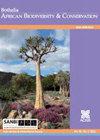水稻曲霉木霉(子囊菌科:下creaceae)批量生产方法的优化
IF 0.5
4区 生物学
Q4 PLANT SCIENCES
引用次数: 1
摘要
以木霉为基础的产品在土壤病害防治中得到了广泛的应用。本研究的目的是确定两种湿润水稻方法(M1和M2)、生长室内两种不同的袋子包装位置和四种不同区域的微孔胶带作为曲霉木霉生产优化过程的一部分的影响。采用因子设计(2 × 2 × 4),重复3次。首先调整M2法的需水量,分别测定0、80、100、120、140、160、180 ml的用量,然后用菌丝发育和产孢两个音符刻度对其进行评价。在两个试验中,对两种方法的菌落重量(CRW)和菌落形成单位(CFU)进行了评价。通过改变袋子中的水量,得出结论,真菌依赖于较高比例的水分在底物中,具有显着差异1南马托格罗索州联邦大学(UFMS)─校园南chapad本文章由计算机程序翻译,如有差异,请以英文原文为准。
Otimização do método de produção massal de Trichoderma asperellum (Ascomycota: Hypocreaceae) em arroz
Products based on Trichoderma spp. are widely used in the control of soil diseases. The objective of this work was to determine the effect of two methods of wetting the rice (M1 and M2), two different bag packing positions in the growth room, and four different areas of microporous tape as part of the production optimization process of Trichoderma asperellum. The adopted design was factorial (2 x 2 x 4) with three repetitions.Initially, the amount of water to be used in the M2 method was adjusted, and the volumes of 0, 80, 100, 120, 140, 160 and 180 ml were tested, and, then, those were evaluated by means of two note scales, one for the development of mycelium and the other for sporulation. The variables colonized rice weight (CRW) and colony forming units (CFU) were also evaluated in two experiments, for both methods. By varying the amount of water in the bag, it is concluded that the fungus is dependent on a higher percentage of moisture in the substrate, with significant differences 1 Universidade Federal de Mato Grosso do Sul (UFMS) ─ Campus Chapadão do Sul, Rodovia MS 306, km 105, Caixa Postal 112 ─ CEP 79560000, Chapadão do Sul, MS, Brasil. 2 Núcleo de Produção de Insumo Orgânico na Propriedade para uso próprio sem fins de comercialização, Fazenda Selia, GO, Brasil. 3 Universidade Federal de Paraíba (UFPB), Campus Mamanguape, PB, Brasil. 4 Universidade Estadual de Rio Grande do Sul (UERGS), Cachoeira do Sul, RS, Brasil. 5 Autor para correspondência: j51173@yahoo.com. Acta Biológica Catarinense 2020 Jul-Set;7(3):46-58 Recebido em: 8 mar. 2019 Aceito em: 13 jul. 2020 Otimização do método de produção massal de Trichoderma asperellum (Ascomycota: Hypocreaceae) em arroz 47 Acta Biológica Catarinense. 2020 Jul-Set;7(3):46-58 (P<0.05). When analyzing the ANOVA, highly significant differences were noticed (P<0.01) for the double and triple interactions between the tested factors. The M2 method allowed a greater time saving, also providing superior values for CRW and CFU, combined with the horizontal position and with a 20 cm2 microporous tape area. This combination promoted the further development of T. asperellum fungus under the conditions tested.
求助全文
通过发布文献求助,成功后即可免费获取论文全文。
去求助
来源期刊

Bothalia
生物-植物科学
CiteScore
1.70
自引率
0.00%
发文量
12
期刊介绍:
Bothalia: African Biodiversity & Conservation is published by AOSIS for the South African National Biodiversity Institute (SANBI) and aims to disseminate knowledge, information and innovative approaches that promote and enhance the wise use and management of biodiversity in order to sustain the systems and species that support and benefit the people of Africa.
The journal was previously published as Bothalia, and had served the South African botanical community since 1921. However the expanded mandate of SANBI necessitated a broader scope for the journal, and in 2014, the subtitle, African Biodiversity & Conservation was added to reflect this change.
 求助内容:
求助内容: 应助结果提醒方式:
应助结果提醒方式:


